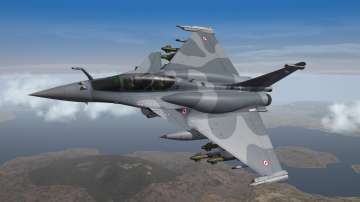Rafale deal row: Dassault CEO clears air, says offset with Reliance only 10 per cent of 'obligation', in talks with 100 other Indian firms
"We're in talks with about 100 Indian firms, including around 30 with which we've already confirmed partnerships", Trappier said.

Dassault Aviation CEO Eric Trappier has cleared the air on the ongoing Rafale jet deal controversy. In his interview to AFP, Trappier said that Dassault Aviation's joint venture with Reliance represents around 10 per cent of the offset investments under the Rafale jet deal.
"We're in talks with about 100 Indian firms, including around 30 with which we've already confirmed partnerships", Trappier said.
"Signing an offset contract is a requirement of Indian law (Defence Procurement Procedure). The implementation of offsets is an obligation and, under the Indian regulation, the choice of the partners belongs to us, Trappier was quoted as saying.
"In full compliance with this regulation, Dassault Aviation therefore decided to set up the DRAL joint venture with Reliance and build a plant in Nagpur, which should enable us to meet about 10% of these offset obligations. We are in negotiations with about a hundred Indian companies and partnerships have already been concluded with about thirty of them," he was quoted as saying.
He said what is called “offset” in English is usually translated into French as “compensation” or “contrepartie”. With regard to the staff and trades unions organisations, Dassault Aviation uses the term “obligation contractuelle d’offset” or “obligation contractuelle de compensation”, he said.
Dassault negotiated for years with Hindustan Aeronautics Limited (HAL) for the order, with the jets being jointly built in India.
But those talks were cancelled after Prime Minister Narendra Modi took office, when he decided to purchase the jets directly from France.
Asked why Dassault chose Reliance over HAL as its partner, Trappier said Dassault Aviation decided to establish a long-term presence in India through DRAL, a joint enterprise in which governance is provided by an Indian Chief Executive Officer and a French Chief Operating Officer.
"Dassault Aviation therefore exercises technical and industrial control over the operations, applying its standards and its flexibility. This JV will produce parts for the Falcon 2000 and Rafale. The choice of the Nagpur site, in central India, was dictated by the availability of land with direct access to an airport runway, he was quoted as saying. Dassault on Wednesday said it had "freely chosen" to form a joint venture with Reliance. But that stance was contradicted recently by former French president Francois Hollande, under whose watch the Rafale deal was signed.
Hollande said last month that France had "no choice" but to join with Reliance after it was pushed by the Indian government -- comments which were seized upon by Indian opposition parties.
Meanwhile, Defence Minister Nirmala Sitharaman who is on a visit to France reiterated the government's claim that it had no idea that Dassault Aviation would team up with Reliance Group, run by Anil Ambani.
Several reports say Dassault was forced to choose Reliance by Prime Minister Narendra Modi, despite its having almost no experience in the aviation sector.
On the eve of Sitharaman's visit, French investigative website Mediapart quoted the notes of a meeting between Dassault management and workers' representatives which described the choice of Reliance as "imperative and compulsory".
"We are very clear: With the government of France, we agreed to purchase 36 Rafale aircraft in flyaway condition," Sitharaman said.
"And in an intergovernmental agreement, there are no mentions of any individual firms," she said.
Earlier on Wednesday, French website "Mediapart' reported that Dassault Aviation agreed to enter into a joint venture with Anil Ambani’s Reliance Defence as it was presented as a 'trade-off' if the defence major were to bag the 36 Rafale jet deal.
However, in its defence, Dassault Aviation clarified that it freely chose to make a partnership with India’s Reliance Group. "This joint-venture, Dassault Reliance Aerospace Ltd (DRAL), was created February 10, 2017. Other partnerships have been signed with other companies such as BTSL, DEFSYS, Kinetic, Mahindra, Maini, SAMTEL,... Other negotiations are ongoing with a hundred-odd other potential partners", it added.
Prime Minister Narendra Modi had announced the procurement of a batch of 36 Rafale jets after talks with the then French President Francois Hollande on April 10, 2015 in Paris. The final deal was sealed on September 23, 2016.
The Congress has been alleging massive irregularities in the deal, saying the government was procuring each aircraft at a cost of over Rs 1,670 crore as against Rs 526 crore finalised by the UPA government when it was negotiating the deal.
However, the government has vehemently rejected the allegations and asserted that it did not have any role in the selection of Reliance Defence.